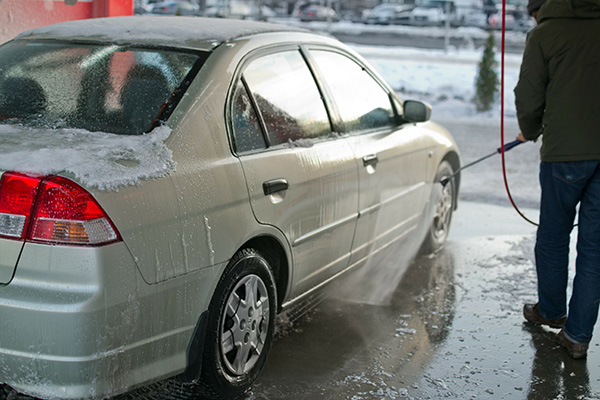
As winter settles in, car owners everywhere are faced with the daunting task of preparing their vehicles for the cold, snowy months ahead. Unfortunately, along with the snow and ice come numerous myths about winter car maintenance, and many of these myths can lead to ineffective (or even harmful) practices. Misunderstanding the truth behind these myths could cause unnecessary expenses or put your vehicle’s performance at risk.
It’s time to debunk some of the most common winter maintenance myths so you can keep your car running safely and smoothly through the colder months.
Myth 1: You Don’t Need to Change Your Oil in Winter
Fiction: Many drivers believe that oil changes are less important during winter and that they can extend the time between oil changes for several months.
Fact: Oil changes are important all year round, especially during winter. In cold temperatures, oil can become thicker, making it harder for the engine to turn over. This is particularly true if you’re using the wrong type of oil for the winter months. Cold weather oil changes help ensure that the oil is circulating properly, preventing damage to the engine. It’s essential to follow the recommended oil change intervals regardless of the season.
Myth 2: Your Car’s Battery Will Survive the Winter Without Any Issues
Fiction: Many believe that car batteries don’t require attention until they die, especially during winter months.
Fact: Cold temperatures can affect your car's battery by reducing its efficiency and making it harder to start the vehicle. Batteries work harder in winter, and older batteries are particularly vulnerable. It’s crucial to inspect your battery before winter sets in, checking for any corrosion, loose terminals, or signs of wear. If your battery is over three years old, consider replacing it to avoid any surprises on the coldest mornings.
Myth 3: You Should Let Your Car Warm Up for Several Minutes Before Driving
Fiction: Many drivers believe that letting their car idle for several minutes before driving is necessary to "warm up" the engine in cold weather.
Fact: Modern vehicles don’t need to idle for long periods before driving, even in winter. Today’s engines are designed to warm up quickly while driving. Idling for long periods not only wastes fuel but also contributes to unnecessary engine wear. It’s much better to start your vehicle, let it run for 30 seconds, and then drive gently until the engine reaches its optimal temperature.
Myth 4: Switching to a Higher-Viscosity Oil Helps in Winter
Fiction: Some people believe that switching to thicker oil in winter will provide better protection against cold temperatures.
Fact: Thicker oil can actually make starting your engine in cold weather more difficult. Engine oils come with different viscosity grades, and the right oil for winter is a multi-viscosity oil, such as 5W-30. This oil allows for better cold-start performance, as it remains fluid enough to flow through the engine and lubricate it efficiently in cold weather. Always follow your manufacturer’s recommended oil type.
Myth 5: All-Wheel Drive Means You Don’t Need Winter Tires
Fiction: With the rise of all-wheel drive (AWD) vehicles, some drivers believe that AWD can replace the need for winter tires.
Fact: While AWD provides power to all four wheels, it doesn’t guarantee better traction on icy or snow-covered roads. Winter tires are designed with special treads and rubber compounds that perform well in freezing temperatures, improving grip and stopping distance. AWD can help you accelerate and maintain control, but winter tires are necessary to maximize your car’s performance and safety during the winter months.
Myth 6: Car Washes Are Unnecessary in Winter
Fiction: Many people avoid car washes during winter, believing that it’s unnecessary since their car will just get dirty again from the snow and salt.
Fact: In fact, regular car washes are especially important during winter. Salt and other chemicals used on icy roads can build up on your car’s undercarriage and body, leading to rust and corrosion. Washing your car regularly during the winter months helps remove this buildup and keeps your car looking better for longer. Make sure to clean the undercarriage and wheel wells, where salt can accumulate and cause damage.
Myth 7: You Don’t Need to Check Your Tire Pressure in Winter
Fiction: Some drivers assume that tire pressure is only an issue during warmer months.
Fact: Tire pressure can fluctuate with the temperature, and it’s especially prone to dropping in winter. For every 10-degree drop in temperature, tire pressure can decrease by 1-2 PSI. Low tire pressure can lead to poor traction, reduced fuel efficiency, and even tire blowouts. It’s important to check your tire pressure regularly throughout the winter, ensuring it’s within the recommended range.
Myth 8: It’s Fine to Drive With an Empty Gas Tank in Winter
Fiction: Some believe that running their car on an empty gas tank won’t cause any issues during the winter months.
Fact: Driving with a low fuel tank can actually be more problematic in cold weather. If your tank is near empty, condensation can build up inside the tank, potentially causing water to get into the fuel system and freezing in cold temperatures. To avoid this, keep your gas tank at least a quarter full during the winter months.
Winter can be tough on your vehicle, but debunking these eight myths and following proper maintenance practices will ensure that your car stays safe, reliable, and comfortable all season long. If you’re unsure whether your car is winter-ready, schedule an appointment with us at Paul's Automotive in Baltimore, MD. Our expert technicians will inspect your vehicle and perform any necessary maintenance to keep you safe on the road.